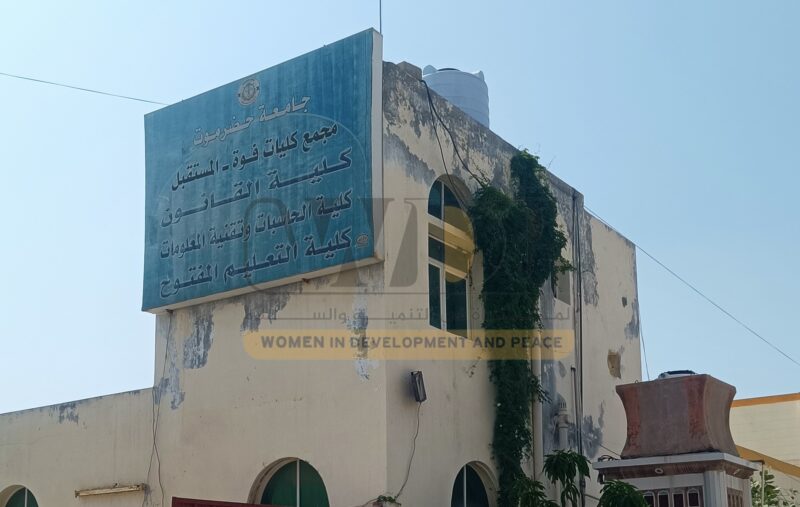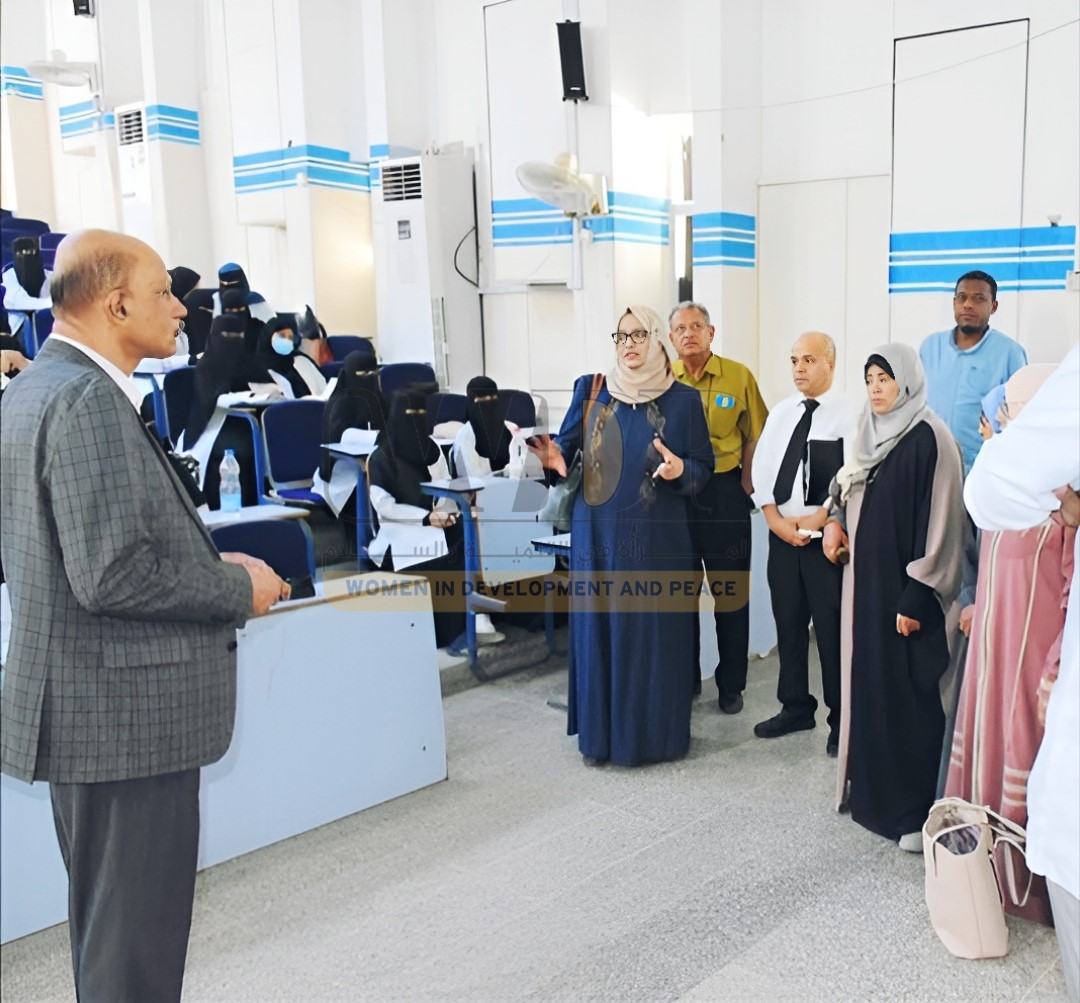Ahmed Bajoaim – Women in Development and Peace
Amid the difficult economic and social conditions that Yemen is going through, girls face many challenges that hinder their access to higher education. However, recent years have witnessed tremendous efforts by international organizations and civil society institutions in supporting and empowering women in this vital field. This is done through providing scholarships at universities and internal institutes, external scholarships, and rehabilitating university housing for female students, which has contributed to a continuous increase in the number of female students in most university majors.
This report aims to highlight the active role of these entities in enhancing higher education opportunities for women in Yemen, through various initiatives and programs aimed at providing a supportive learning environment and achieving gender equality. We will also review the most prominent projects and initiatives, in addition to the challenges and opportunities facing these efforts, to highlight the positive impact of international organizations and local institutions, and to provide recommendations to enhance these efforts soon.
The Role of International and Local Organizations
A recent report by the United Nations Development Program in Yemen, entitled “70 Steps Towards a More Resilient Education System in Yemen,” 2024, stated that the branch of the Health Institute in the Tarim district of Hadhramaut Governorate launched a project to enhance institutional resilience with funding from the UN program. The project is a qualitative initiative aimed at facilitating girls’ access to higher education opportunities, especially in the field of healthcare.
This project comes in line with the fourth goal of the institutional and economic resilience goals that the program seeks to achieve, which focuses on education as a fundamental pillar of sustainable development. The institute has succeeded in qualifying and training more than 60 young women from the city of Tarim in the field of healthcare; they were provided with the necessary skills to work in the field of nursing and midwifery.
The Executive Director of Sila Foundation for Development, Ali Bashammakh, indicated that the foundation has made education one of its strategic plans, and has also allocated girls’ education among its main priorities, as it is a natural right for the individual guaranteed by all divine laws and human laws. Societies cannot develop except through science and education, and women are the basis for preparing the individual and the family and building societies and homelands.
Bashammakh confirmed that the most important interventions of the foundation in the field of education are improving infrastructure and a suitable educational environment by providing logistical and financial support and enhancing educational opportunities for women at various stages to ensure the continuity of their education and empower them academically.
For her part, the President of Al-Amal Women’s Foundation, Dr. Abha Ba-Awaidhan, explained that university and academic education is very important for women. It is a stage of completing empowerment or a stage of preparation for societal participation with high efficiency in all fields and specializations. This is reflected, of course, in the quality of their performance and their ability to deal with the societal challenges they face, and this is much better than if they had not obtained this high scientific standing. This aspect instills confidence and empowers individuals to contribute meaningfully to society.
Activities and Programs
Bashammakh said that “Sila” has many activities to empower women in higher and academic education. Among the most important of these activities or interventions are scholarships and study programs. The foundation provides full scholarships for outstanding female students at the university and postgraduate levels and implements training and development programs for university students to enhance their academic and research skills. Also, a branch of Hadhramaut University (Bachelor’s degree course) was opened in Daw’an district, west of Hadhramaut, to encourage and support girls in rural areas to continue their university education, in addition to providing comfortable transportation buses for girls to enable them to continue the basic stage, which is the basic structure for completing academic education.
He continued, “Sila Foundation opened literacy classes in reading and writing to empower women who have passed the legal age for education to acquire these basic skills. In addition to that, the foundation intervened in improving and developing the educational environment in educational centers specialized in women’s education to provide a suitable and encouraging environment for continuing education and organizing training courses for university students in the fields of leadership, entrepreneurship, and communication. The foundation also worked to develop the capabilities of academics and researchers in universities and research centers by providing guidance and counseling programs for students to choose appropriate scientific and research specializations.”
He added: “The foundation has concluded many partnerships and advocacy with universities and colleges to enhance women’s participation in higher education, and to stay in constant contact with the concerned authorities to increase the chances of accepting female students in scientific disciplines, and to make direct contacts with some concerned offices to employ them after their studies, as well as organizing events and forums to highlight women’s achievements in the academic field.”
Ba-Awaidhan explained that Al-Amal Women’s Foundation has many programs in which it is active to support girls’ education in universities; they were targeted according to criteria and choices that enabled them to obtain the necessary support and programs. The foundation also supports outstanding female students and volunteers by enrolling them in postgraduate studies programs and covering their tuition fees. The activities have a very effective impact because they refine the capabilities of the participants and help them complete their academic education efficiently.
Statistics and Figures
The Executive Director of Sila Foundation, Bashammakh, touched upon the existence of many initiatives and activities targeting women and female students in recent years, including financial, training, and cultural grants, workshops, and various events. These efforts aim to empower women and increase their participation in society to a greater extent. From this standpoint, all the programs implemented by the foundation in empowering women are academic programs, and they have had a prominent role and impact in making a positive impact in those targeted communities, according to United Nations standards.
He said: “Our interventions in the field of girls’ education resulted in nine rural districts in Hadhramaut gaining the opportunity to educate their girls. Additionally, 133 villages benefited from the program’s outputs, and 67 educational and health facilities received services from the program’s graduates. About 60,840 patients received at least one service from the graduates working in these health facilities. Furthermore, we reduced the shortage of educational and health personnel in those areas by more than 80%. The foundation was not limited to encouraging women to continue their education internally, but also included them in scholarship programs for studying abroad.”
Regarding the number of recipients of higher education scholarships, Bashammakh indicated that 314 girls received scholarships in the following specializations: Community Midwifery, General Nursing, a teaching diploma in Mathematics and Arabic Language, and a Bachelor of Education in Mathematics, Arabic Language, Sciences, Social Studies, and Quran and its Sciences. In Wadi Al-Ain and Hawra districts of Hadhramaut, 99 female students graduated with teaching diplomas in Mathematics and Sciences, as well as in technical nursing. Additionally, many graduates in various specializations are from the districts of Huridha, A’md, Rakhya, Ghail Bin Yameen, Al-Dhallai’a, Yab’uth, Al-Soom, Seiyun in Hadhramaut Governorate, and Ataq district in Shabwa. The total number of girls who benefited from scholarships across these specializations reached 703. Ba-Awaidhan confirmed that Al-Amal Women’s Foundation sponsors more than 130 female students in university education and more than 10 female students in academic programs (PhD and Master’s).
In conclusion, the support provided by international organizations and development institutions provides Yemeni women with greater opportunities to enroll in higher education, which contributes to their economic and social empowerment. Despite the ongoing challenges, these efforts remain a beacon of hope, promoting gender equality and establishing a brighter future for Yemeni women.


